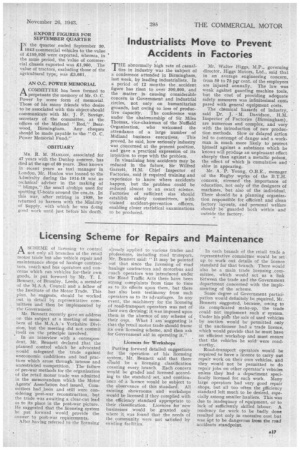Industrialists Move to Prevent Accidents in Factories
Page 19

If you've noticed an error in this article please click here to report it so we can fix it.
THE abnormally high rate of casual ties in industry was the subject of a conference attended in Birmingham, last week, by leading industrialists. In a period of 12 months the accident figure has risen to over 300,000, and the matter is causing considerable concern in Government and industrial circles, not only on humanitarian grounds, but owing to loss of produc tive capacity. The conference was under the chairmanship of Sir Miles Thomas, vice-chairman of the Nuffield Organization, who welcomed• theattendance of a large number of Midland business executives. This proved, he said, how seriously industry was concerned at the present position, and gave a practical expression of its intention to cope with the problem.
In visualizing how accidents may be reduced in the future, Sir Wilfred Garrett, H.M. Chief Inspector of Factories, said it required training and experience ta know where accidents happen, but the problem could be reduced almost to an exact science. Factories of sufficient size should establish safety committees, with trained accident-prevention officers, enabling closer statistical examinations to be produced.
Mr: Walter Higgs, M.P., governing director, Higgs Motors, Ltd., said that in an average engineering concern, from 50 to 75 pr cent. of the employees are injured annually. The law was weak against guarding machine tools, hut the cost of providing adequate safety measures was infinitesimal corn, pared with general equipment costs.
The chemical hazards of industry, said Dr. J. M. Davidson, H.M. Inspector of Factories (Birmingham), are numerous and complex, and vary with the introduction of new production methods. Slow or delayed action led to contempt of danger and a workman is much more likely to protect himself against a substance which he knows will produc.e an unpleasant effect sharply than against a metallic poison, the effect of which is cumulative and skiw in appearing.
Mr. A. P. Young, 0.B.E., manager of the Rugby works of the B.T.H. concern, stressed the importance of education, not only of the designers of machines, hut also of the individual. There should be a planning organization responsible for efficient and clean factory layouts, and personal welfare shouldbe guarded both within and outside the factory.




















































